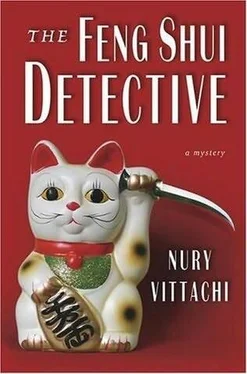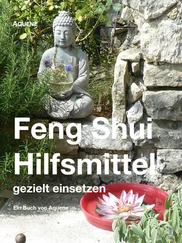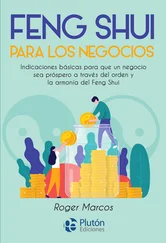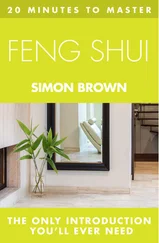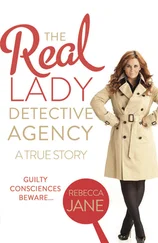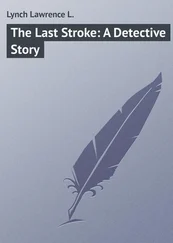‘Was there any change?’ asked Wong. ‘Did he drink more?’
‘When he was younger, he never drank. He was a Muslim, but not religious. Then he started drinking a little bit, but not a problem. Couple of Kingfishers, that’s all.’
Joyce asked: ‘Did he come with the same people all the time?’
‘Mostly alone. Sometimes with Mr Kanagaratnum,’ he said, pointing at Ravi. ‘You become good friends, no?’
‘To some extent,’ said Ravi. ‘He was a difficult man to get to know. Not much of a talker. Once a week or so I would join him here. He never spoke of any health problems. I’m still stunned that he is dead.’
The club manager went to tend to other customers, and the three diners spent the rest of the meal talking about the relationship between the Indian firm and the Far East ones, the standard corporate chit-chat of business travellers. Joyce gave Ravi a piece of paper on which was written the name of a cosmetics company. ‘Do you know where I could get stuff from this company? They make like, totally fab eyeliner.’
Ravi was a great eater. He consumed everything that was left on the trays when Wong and McQuinnie were finished, polished off a fifth beer, patted his rice-belly and then took the young woman on a tour of the club’s facilities, which included a library and a gymnasium that was so under-used that several of the machines had never been plugged in.
Wong told them that he would wait for them in the canteen.
While he was putting on his suit-coat, he chatted briefly with the club’s oldest waiter, who had a walrus moustache that would have better suited a British major-general.
‘Please, what do you remember about Mr Sekhar’s visits?’
‘His favourite for years used to be aloo makhani and chicken korma,’ said the old man, his voice slightly muffled by the weight of hair on his upper lip and lack of teeth. ‘Lately he got this taste for vindaloos, double vindaloos and palis even. He quickly became hot-stuff king, and used to challenge the chef to make something too hot for him to eat.’
‘Did he eat alone? Or with friends?’
‘Sometimes alone, sometimes with friends. Sometimes Mr Kanagaratnum, Mr Jagdish, Mr Govind, or someone else from the company. No one could eat the killer chilli like Mr Sekhar, though. Our food is quite hot.’
‘Is,’ Wong said. He had lost all sensation in his tongue, although he considered himself an experienced eater of spicy food. ‘He drink much beer?’
‘No. Always two Kingfishers, three on special occasions.’
‘Did he ever talk to you about any problem?’
‘Business was not so good. He used to sometimes come alone and bring business papers, all numbers, and he would do sums while he ate. Once I saw him by himself and he seemed to be crying into his bhaji. He never talked to me about his problems, though.’
‘Thank you,’ said Wong as his companions returned.

That night, Wong worked in his room at Rose House until midnight. He then slept until about five o’clock when he had to rise and go to the toilet rather urgently. He stayed in the bathroom for a long while. Fortunately, he did not feel particularly ill. He suspected that the food he had eaten had not been bad, but was eliciting complaints from his stomach because of its unfamiliarity.
Dawn came slowly. Over an uneaten breakfast, Joyce was unusually silent, and was later induced to admit that she had had similar problems with her digestion.
Their host, Mrs Daswani, laughed. ‘I’m sorry, but our bacteria here in India are quite unique. It always takes visitors a few days to get used to it. Some tourists swear by a slug of whisky every night. Kills all known germs. You’ll be fine in a few hours.’
Both the visitors slumped silently in the car as they were driven to the centre of town. They were back at the Associated Food and Beverages Delhi Manufactory Old Building at 9.30 a.m., and Ravi led them to the Far East department, which they knew they would never have re-found without him. The internal engineering department’s team was standing at attention, waiting for the plans. The two visitors spent the next hour giving detailed instructions to the foreman and his staff.
Wong and McQuinnie then moved to a spare office, near Kanagaratnum’s. The young woman grabbed a phone and started dialling. ‘My uncle’s a journalist,’ she said. ‘I worked in his office for a summer job last year. I’m going to do a bit of what he calls “working the phones”.’
She spent the next half-hour on the phone, being transferred from person to person, until she found what she was looking for: an expert in pathology and poisons at a medical school attached to the university. She had a theory she wanted to check out.
Not for the first time, Wong marvelled at the ability of a Western female to command Asian males to do her bidding. Without any indication of her authority other than her bossy phone manner, Joyce soon had the man obediently answering a lengthy list of questions, which she shouted down the phone, since the line was poor.
‘Dr Prasad, are there poisons which are like, really really slow-working and which would like, not be detected in an autopsy?’
Wong picked up the extension handset to listen to the man’s answer. ‘That is a very hard question, since it all depends on your understanding of what a poison is,’ said the voice on a crackly line. ‘The word usually conjures up images of strychnine, or arsenic, or some forms of mercury perhaps. These quickly and obviously do great damage. But consider alcohol. This is also a lethal poison, but taken in small quantities over a long time, it is not lethal, and some doctors-I am not among them-say it may even do some good. If you drank a bottle of detergent, it would make you very sick. Yet every night, we all consume tiny amounts of detergent left as residue on the cups and plates we use. You see, Ms McQuinnine, almost anything can be a poison if you take an inappropriate quantity of it over an inappropriate period, you see what I am saying?’
‘Yeah. I see. It’s McQuinnie, not McQuinnine. But is there any… I mean, like, is there a poison that you could use, and doctors doing an autopsy would just be like, “Oh, it’s natural causes or a heart attack”?’
‘There are many substances which can be introduced at low levels and could eventually lead to death. Most, I am glad to say, are detectable, particularly if the autopsy is done promptly, not more than a couple of days after death.’
‘Okay, thanks Dr Presshard.’
‘Prasad. It’s Prasad.’
During the lunch break, Wong and McQuinnie ate with Mardiyah Dev (at least, Ms Dev ate, while the two visitors pushed food around their plates and took tiny sips of bottled water). The Malaysian woman added little that she had not already told them the previous day. She said she believed Sooti Sekhar’s autopsy had been performed promptly, the morning following his death late one afternoon. ‘There were no suspicious circumstances,’ she said.
The assignment seemed to be over, the geomancer thought. The rooms had been done, and Sooti Sekhar had been confirmed by all routes of inquiry as a victim of death by natural causes. But Joyce’s doggedness had inspired him. Perhaps it would be worth making one final call. They should speak to the man who did the autopsy, he decided.
That afternoon, Wong phoned Dr Ran, brother-in-law of the dead man. The geomancer also had to shout into the phone. ‘Hello? Is it Dr Ran? What? Yes? I am Mr Wong from East Trade Industries. I am working today at Associated Food and Beverages. No, no, I am not selling anything. I am a feng shui master. I want to ask you about Mr Sekhar. What? No, I do not want to come to your surgery. Sick? I am not sick. What? You ask what? Who is sicker? No, not sicker. I am not saying sicker. I am saying Sekhar. Your brother-in-law is sicker. I mean Sekhar. Yes, yes, I know he is dead.’
Читать дальше
